Kenneth L. Gentry Jr.'s Blog, page 103
December 11, 2015
Accidental Posting
 Special note: Followers of PostmillennialismToday, recently received an email with a link to a posting that was not supposed to load until later in December. I accidentally hit the PUBLISH button when I should have set a publication date for the article. Sorry about that! You will eventually receive that article — which was Part 3 of a three-part study soon to be posted.
Special note: Followers of PostmillennialismToday, recently received an email with a link to a posting that was not supposed to load until later in December. I accidentally hit the PUBLISH button when I should have set a publication date for the article. Sorry about that! You will eventually receive that article — which was Part 3 of a three-part study soon to be posted.








SATAN’S BINDING; YOUR HOPE (1)
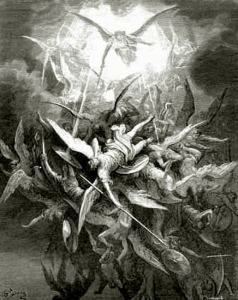 PMT 2015-149 by Kenneth L. Gentry, Jr.
PMT 2015-149 by Kenneth L. Gentry, Jr.
The Christian worldview recognizes the reality of the spirit world. We certainly believe in God “who is a spirit” (John 4:24) and in the Third Person of the Trinity, the “Holy Spirit” (Matt. 28:19). Even we ourselves are compounds of spirit and body (Gen. 2:7; James 2:26), so that when we die “the dust will return to the earth as it was, and the spirit will return to God who gave it” (Eccl. 12:7; cp. Matt. 10:28).
We also know of angels who are spirit-beings created by God to do his will: “Of the angels he saith, Who makes his angels spirits, and his ministers a flame of fire” (Heb. 1:7). Some of these angels are holy, elect angels always serving God in righteousness (Luke 9:26; 1 Tim. 5:21). Others are fallen angels who resist God, determining to do evil against us (Luke 8:2; 1 Tim. 4:1). They have as their ruler, Satan the chief of the fallen angels (Matt. 25:41; Mark 2:22).
Satan’s Mission
When considering spiritual warfare in the Christian life, we must not factor out the influence of Satan in the world. The Scriptures portray him as the epitome of evil who always opposes God.1 He seeks to destroy God’s work by influencing men throughout the world (Matt. 13:38-39; 2 Cor. 4:4) to do his evil will (John 8:44; 2 Tim. 2:26). He is a deceiver (Rev. 20:1) who “disguises himself as an angel of light” (2 Cor. 11:14) so that he “deceives the whole world” (Rev. 12:9). He desires to draw away those who hear the Word of God (Luke 8:12). In fact, he delights in working on those who not only hear the Word, but profess it (Acts 5:3; 1 Tim. 5:15).
Four Views on the Book of Revelation
(ed. by Marvin Pate)
Helpful presentation of four approaches to Revelation. Ken Gentry writes the chapter on the preterist approach to Revelation, which provides a 50 page survey of Revelation .
See more study materials at: www.KennethGentry.com
He is so determined to do evil, that he even dares to tempt the Son of God: “Then Jesus was led up by the Spirit into the wilderness to be tempted by the devil” (Matt. 4:1; Luke 4:2). In desperation he later entered into Judas, moving him to betray Christ (Luke 22:3; John 13:2).
As Luther so excessively declared: “his craft and power are great.” Indeed, the Scripture itself urges us: “Be of sober spirit, be on the alert. Your adversary, the devil, prowls about like a roaring lion, seeking someone to devour” (1 Peter 5:8). How can we expect to win against such a supernatural foe who “seeks to work us woe”? What gives us hope against such a mighty opponent?
Christ’s Victory
The answer to our fearful concern is the victory cry: “He is risen!” (Matt. 28:6). Unfortunately, this glorious declaration is largely muted by the confused prophets loudly misleading many today. Too many Christians believe “Satan is alive and well on planet earth.” Though he is alive, he is not well. Christ has won the victory over him. Let us see how this is so, then note how we have hope for personal victory over him.
“Reformed Interpretation of the Binding of Satan” by Ken Gentry
An 8 1/2 x 11 study paper
An exegetical study of Revelation 20:1–3. This study shows that the binding of Satan begins in the first century with the establishing of Christ’s kingdom by the Lord Jesus Christ.
See more study materials at: www.KennethGentry.com
In Revelation 20, a passage both confused and abused in popular Christian literature, we read of the Satan’s binding which insures the victory of Christ’s kingdom: “He laid hold of the dragon, the serpent of old, who is the devil and Satan, and bound him for a thousand years, and threw him into the abyss, and shut it and sealed it over him, so that he should not deceive the nations any longer. . . . Blessed and holy is the one who has a part in the first resurrection; over these the second death has no power, but they will be priests of God and of Christ and will reign with Him for a thousand years” (Rev. 20:2-3, 6).
This dramatic imagery teaches that Satan has been “bound” so that he “should not deceive the nations any longer.” This allows all those who are spiritually resurrected believers to “reign with him” in his kingdom. Despite popular misunderstanding of this passage, this vision speaks of realities already established in Christ’s first coming, as we can tell from several reasons. Reasons to be continued in my next blog!
Click on these images for information on these titles:


December 9, 2015
THE GREATEST TURNING OF MUSLIMS TO CHRIST
 PMT 2015-148 by Lucinda Borkett-Jones (The Aquila Report)
PMT 2015-148 by Lucinda Borkett-Jones (The Aquila Report)
Despite the daily news of the persecution of Christians around the world by Islamist groups, there is another, lesser-known story of growing numbers of Muslims around the world who are turning to Christ as Lord.
Missionary David Garrison’s book, A Wind in the House of Islam, charts this phenomenon, which he says demonstrates that “we are living in the midst of the greatest turning of Muslims to Christ in history”.
The book is the result of two and a half years of research and involved travelling more than 250,000 miles to conduct interviews with more than 1,000 people around the Muslim world. In the study, a ‘movement’ of believers is defined as a group of more than 1,000 baptised believers or 100 new churches within a Muslim community. In total he found 69 movements that had started in the first 12 years of the 21st century, in comparison with virtually no voluntary movements of converts to Christianity in the first 12 centuries of Islam.
David Garrison spent two and a half years interviewing Muslim converts to Christ about their faith.
Garrison, who has been a missionary pioneer with the the Southern Baptist International Mission Board for nearly 30 years, told Christian Today that he started out with a “healthy scepticism” about the number of new believers, imagining that the figures might be have been over-estimated. Instead, he found that numbers were often vastly under-reported.
Christianity and the World Religions:
By Derek CooperCooper. Examines the rival worldviews found in Hinduism, Buddhism, Confucianism and Taoism, Judaism, Islam, and irreligion. He engages these worldviews from a Christian perspective.
See more study materials:
www.KennethGentry.com
“What is exciting is not just how big the movements are…but how many of these movements there are now and that they’re not limited to one corner of the world, but we’re seeing them from West Africa to Indonesia, and virtually everywhere in between,” he says.
Muslims who convert to Christianity can face the death penalty and many experience intense persecution, so converts are often underground, making it impossible to know exactly how many new believers there are, but estimates currently range between 2 and 7 million.
So why is this turning to Christ happening now? “God has brought several elements together uniquely in our time,” he says. “Some of them are old elements – Muslim violence is not new, this is one of the least violent centuries in Muslim history – but what’s different is today when Muslims experience this violence, they can see an alternative… they can switch on their Internet, they can turn on their television and hear an evangelist speaking Farsi or Kazakh or Uzbek.”
It’s also the combination of Bible translation alongside the potential for multimedia evangelism and the growth of international travel that appears to have facilitated this change. “It’s a great day that God seems to be orchestrating for this to happen.”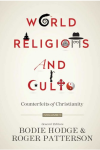
World Religions and Cults (Bodie Hodge, ed.)
This work is helpful for understanding and combating false religions and cults. It deals with the leading false religious beliefs in the world today.
See more study materials at: www.KennethGentry.com
Among the converts he met were numerous senior religious leaders. On Christmas Day 2011 he met with 20 leaders from a fundamentalist Muslim people group; 19 had been baptised, 17 were imams (leaders of the mosque) and three of them were women.
To continue reading the article: Click here









December 7, 2015
PSALM 2, LITERALISM, AND POSTMILLENNIALISM
 PMT 2015-147 by Kenneth L. Gentry, Jr.
PMT 2015-147 by Kenneth L. Gentry, Jr.
An important postmillennial text is Psalm 2. Psalm 2:8 states:
Ask of Me, and I will surely give the nations as Your inheritance, / And the very ends of the earth as Your possession.
An Amillennial Objection
Amillennialists often object to postmillennialism’s use of this verse. They complain that postmillennialists apply the terms ‘nations’ and ‘earth’ in a way that Jesus and the apostles never intended: as political entities. The amillennialist argues that the NT teaches that Christ’s making the nations and the earth his footstool simply refers to the salvation of scattered Gentiles from every tribe tongue and nation, not Christ’s influence on political structures, etc.
The Glory of Christ (book by R. C. Sproul)
From the angels’ revelation of Jesus’ glory to the shepherds outside Bethlehem,
to Jesus’ life-changing revelation of His glory to Paul on the Damascus road, Sproul guides us to a deeper understanding of Christ’s glory.
For more study materials: www.KennethGentry.com
How shall the postmillennialist respond?
First, we must be careful not to throw out all literalism just because dispensationalism wrongly uses it. Literalism may be abused, to be sure. But many verses must be interpreted literally. So charging postmillennialism as a simplistic, naive, dispensational-like eschatology is simply name-calling. I
Second, I don’t see the problem with using Psalm 2:8 as evidence of postmillennialism. That is, I don’t understand what the issue of “political entities”/ “political structures” has anything to do with the amillennial/postmillennial debate here. Even setting aside the idea that particular political entities are in view here, the fact remains that the psalm declares that Christ will make “the nations” (whatever they are) and “the very ends of the earth” his possession. He is not speaking merely of scattered converts here-and-there from out of the nations. Rather he seems clearly to be speaking of vast influence over all the nations and even to the very ends of the earth. The psalm appears to be speaking of some sort of global dominance.
Third, nevertheless, I would note that David does call upon the kings and judges of the earth to do homage to the Son (Psa 2:10-12). It seems he goes to great lengths to speak of not only people in general but even their political rulers and judges.
Fourth, besides all of this, reducing the significance of Psalm 2 would not affect the broader argument for postmillennialism. Postmillennialism is not a “one text” eschatological system (as premillennialism tends to be with Rev 20).
God Gave Wine (by Ken Gentry)
A biblical defense of moderate alcohol consumption. Considers all key biblical passages and engages the leading objections.
See more study materials at: www.KennethGentry.com








December 4, 2015
REVIVAL IN THE MIDDLE EAST?
 PMT 2015-146 by J. D. King (World Revival Network)
PMT 2015-146 by J. D. King (World Revival Network)
The churning, tempestuous world looks remarkably different than many imagine. This is undoubtedly true if you’re an average American.
In the darkest corners of the Middle-East there’s a revival beginning that’s unprecedented in the history of world missions. I’ve previously reflected on it here and here, but I wanted to take this amazing story further than before.
I hope that you’ll journey with me as I explore unbelievable developments in the expansion of Christianity in the Middle-East.
Reliable reports suggest more Muslims have become followers of Jesus over the last two decades than in Islam’s combined 1,500 year history. Based on the accounts of several missiologists, it has been surmised that “more Muslims have committed to follow Christ in the last 10 years than in the last 15 centuries of Islam.”[1] In spite of great difficulty and turmoil, Christianity is unquestionably expanding throughout Islamic world. God is up to something amazing in a region that many have thought was unreachable.
Rosenberg’s Insights Into The Middle-Eastern Revival
Joel Rosenberg, an Evangelical researcher, author, and resident of Israel has documented the recent upsurge of Christianity in the Middle-East. Through first-hand reconnaissance, coupled with reports from Arabic nationals, Rosenberg demonstrates that Christianity is rising rapidly in the world of Islam.
Admittedly some of the following statistics have shifted in the aftermath of the Isis and other violent demonstrations against Christians. Those who follow Jesus have been slaughtered and have experienced severe persecution in this region. Nevertheless, Joel Rosenberg’s observations provide a window into many amazing developments.
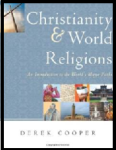
Christianity and the World Religions
By Derek CooperCooper. Examines the rival worldviews found in Hinduism, Buddhism, Confucianism and Taoism, Judaism, Islam, and irreligion. He engages these worldviews from a Christian perspective.
See more study materials: www.KennethGentry.com
Some of the particulars can certainly be debated, but in many of the Mediterranean nations, Christianity is making extraordinary inroads. Though the subsequent conversion figures are impossible to confirm, even in their imprecision, they provide a snapshot of what’s transpiring in the Middle East.
Sudan
A number of reports suggest that increasing numbers of Christ-followers are emerging in the brutal, war-torn nation of Sudan. Here, in the Nile river valley – along the Islamic strongholds of Northern Africa – It is being noted that
“One million Sudanese have turned to Christ since the year 2000—not in spite of persecution, war, and genocide, but because of them…the estimated total number of believers in the country is more than 5.5 million.”[2]
Many are convinced that the great brutalities that this nation has encountered are becoming a catalyst for the expansion and growth of Christianity. Rather than inhibiting the Church, the war is actually propelling it….
To continue reading this article: Click here
For helpful further reading, click on these images:










December 2, 2015
WARFIELD ON 1 JOHN 2:2 (3)
 “Jesus Christ the Propitiation for the Whole World” (3)
“Jesus Christ the Propitiation for the Whole World” (3)
PMT 2015-0144 by Benjamin B. Warfield
[Gentry note: This is part 3 of an excellent article by renowned postmillennial Princeton scholar, B. B. Warfield.]
The Meaning of “Propitiation”
The expedient made use of by many commentators in their endeavor to escape from this maze of contradictions is to distinguish between Christ as our “Advocate” and Christ as our “Propitiation,” and to connect actual salvation with him only in the former function. Thus Richard Rothe tells us that “the propitiation in Christ concerns the whole world,” but “only those in Christ have an advocate in Christ,” with the intimation that it is Christ’s advocacy which “makes the efficacy of his propitiation effective before God.” In this view the propitiation is conceived as merely laying a basis for actual forgiveness of sins, and is spoken of therefore rather as “sufficient” than efficacious—becoming efficacious only through the act of faith on the part of the believer by which he secures Christ as his Advocate. This is the view presented by B. F. Westcott also, according to whom Christ is advocate exclusively for Christians, while he is a propitiation for the whole world. His propitiatory death on earth was for all men; his advocacy in heaven is for those only who believe in him. Here, there is a universal atonement taught, with a limited application, contingent on actual faith: “the efficacy of his work for the individual depends upon fellowship with him.”
It is obvious that such a view can be held only at the cost of emptying the conception of propitiation of its properly expiatory content, and shifting the really saving operation of Christ from his “atoning” death on earth to his “intercession” in heaven. Westcott carries out this whole program fully, and by a special doctrine of “sacrifice,” of “blood” and its efficacy, and of “the heavenly High Priesthood of Christ” systematizes this point of view into a definite scheme of doctrine. No support is given this elaborate construction by John; and our present passage is enough to shatter the foundation on which it is built, in common with many other constructions sharing with it the general notion that the atonement is to be conceived as universal while its application is particular, and that we may therefore speak of the sins of the whole world as expiated while believers only enjoy the benefits of this expiation.
He Shall Have Dominion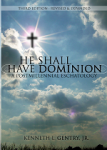
(paperback by Kenneth Gentry)
A classic, thorough explanation and defense of postmillennialism (600+ pages). Complete with several chapters answering specific objections.
See more study materials at: www.KennethGentry.com
The “advocacy” of our Lord is indeed based on his propitiation. But it is based on it not as if it bore merely an accidental relation to it, and might or might not, at will, follow on it; but as its natural and indeed necessary issue. John introduces the declaration that Christ is—not “was,” the propitiation is as continuous in its effect as the advocacy—our propitiation, in order to support his reference of sinning Christians to Christ as their Advocate with the Father, and give them confidence in the efficacy of his advocacy. The efficacy of the advocacy rests on that of the propitiation not the efficacy of the propitiation on that of the advocacy. It was in the propitiatory death of Christ that John finds Christ’s saving work: the advocacy is only its continuation—its unceasing presentation in heaven.
The propitiation accordingly not merely lays a foundation for a saving operation, to follow or not follow as circumstances may determine. It itself saves. And this saving work is common to Christians and “the whole world.” By it the sins of the one as of the other are expiated, that is to say, as Weiss wishes to express it in Old Testament forms of speech, are “covered in the sight of God.” They no longer exist for God—and are not they blessed whose iniquities are forgiven, and whose sins are covered, to whom the Lord will not reckon sin? It is idle to talk of expounding this passage until we are ready to recognize that according to its express assertion the “whole world” is saved. Its fundamental assumption is that all those for whose sins he is—is, not “was”—the propitiation have in him an Advocate with the Father, prevailingly presenting his “righteousness” to the Father and thereby securing their salvation.
The Question of Universalism
This is, of course, universalism. And it is in determining the precise nature of the universalism that it is, that we arrive at last at John’s real meaning. In declaring that Jesus Christ is a propitiation for the whole world, John certainly does not mean to assert that Christ has made expiation for all the sins of every individual man who has come or will come into being, from the beginning of the race in Adam to its end at the last day.
Baumgarten-Crusius seems to stand almost alone in expressly emphasizing the protensive aspect of the “world”; and he does it in order to avoid admitting that John means to present Christ as the Savior of the whole world extensively considered. John means only, he says, that Christ is a Savior with abiding power for the whole human era; all through the ages he is mighty to save, though he saves only his own. It is much more common silently to assume that by “the whole world” John has in mind the whole race of mankind throughout the entire range of its existence in time: few have the hardihood openly to assert it. It is ordinarily taken for granted (Huther is one of the few who give it explicit expression) that “John was thinking directly of the ‘world’ as it existed in his time.” Huther indeed adds the words: “without however limiting the idea to it,” and thus suggests that John was thinking of the “world” protensively as well as extensively, without explicitly saying so. Clearly in any event it would be impossible to attribute to John teaching to the effect that Christ’s expiatory work concerned only those who happened to be living in his own—or John’s —generation. This would yield a conception of the range of the propitiatory efficacy of our Lord’s death which can be looked upon only as grotesque.
Lord of the Saved
(by Ken Gentry)
A critique of easy believism and affirmation of Lordship salvation. Shows the necessity of true, repentant faith to salvation.
See more study materials at: www.KennethGentry.com
Yet there is nothing in John’s language to justify the attribution to him of a protensive conception of “the whole world” in the sense of the universalists. It seems quite clear that, by “the whole world,” he means primarily the world extensively conceived. It is equally clear, however, that he means neither to confine the efficacy of Christ’s blood to his own generation, nor to maintain that the entirety of contemporary humanity was saved. He knew of those not of his own time who were saved; he knew of children of the devil in his own day. There is a protensive element in his conception of the word. It is however of its protension in the future rather than in the past that he is thinking. He sees the world not only lying on every side of him in space, but very especially as stretching out before him in time. The contrast between it and the little flock of Christians includes thus a contrast of times.
The interpretation of our passage has suffered seriously from a mechanical treatment of its language. We must permit to John the flexibility customary among men in the handling of human speech. When be speaks of Christ as a propitiation “for the whole world,” we cannot either confine his language rigidly to the world of his own day, or expand it with equal rigidity to the extremest limit of the possible connotation of the phrase. He is certainly intending to present Christ as a world-wide Savior by whom nothing less than the world is saved; but it does not follow that he means to affirm that therefore no single man of all who ever live in the world is omitted. He is obviously thinking in the terms of the great phrase he is himself a little later to use, when he declares that the Father has sent the Son “as Savior of the world.” To him Jesus Christ is very expressly the Savior of the whole world: he had come into the world to save not individuals merely, out of the world, but the world itself. It belongs therefore distinctly to his mission that he should take away the sin of the world. It is this great conception which John is reflecting in the phrase, “he is the propitiation for our sins, and not for ours only but for the whole world.”
This must not be diluted into the notion that he came to offer salvation to the world, or to do his part toward the salvation of the world, or to lay such a basis for salvation that it is the world’s fault if it is not saved. John’s thinking does not run on such lines; and what he actually says is something very different, namely that Jesus Christ is a propitiation for the whole world, that he has expiated the whole world’s sins. He came into the world because of love of the world, in order that he might save the world, and he actually saves the world. Where the expositors have gone astray is in not perceiving that this salvation of the world was not conceived by John—any more than the salvation of the individual—accomplishing itself all at once. Jesus came to save the world, and the world will through him be saved; at the end of the day he will have a saved world to present to his father. John’s mind is running forward to the completion of his saving work; and he is speaking of his Lord from the point of view of this completed work. From that point of view he is the Savior of the world.
Conceptions like those embodied in the Parables of the Mustard Seed and the Leaven lay at the back of John’s mind. He perfectly understood that the Church as it was phenomenally present to his observation was but “a little flock.” He as perfectly understood that it was after a while to cover the whole world. And therefore he proclaims Jesus the Savior of the world and declares him a propitiation for the whole world. He is a universalist; he teaches the salvation of the whole world. But he is not an “each and every” universalist he is an eschatological” universalist. He teaches the salvation of the world through a process; it may be— it has proved to be— a long process; but it is a process which shall reach its goal. It is not then “our” sins only which Jesus has expiated—the sins of the “little flock,” now living within the range almost of John’s physical vision. He has expiated also the sins of “the whole world”; and at the end, therefore we shall be nothing less than a world saved by him. The contrast between the “our” and “the world” in John’s mind, therefore, is at bottom the contrast between the smallness of the beginnings and the greatness of the end of the Christian development.
And what his declaration is, at its core, is thus only another of those numerous —prophecies, shall we say? or assertions?—which meet us throughout the apostolic teaching, of the ultimate conquest of the world by Christ. Christ, he tells his “little flock,” is the “propitiation for our sins”; in him “we” have found a full salvation. But he is not willing to stop there. His glad eyes look out on a saved world. “And not for ours only,” he adds, “but also for the whole world.” We are a “little flock” now: tomorrow we shall be the world. We are but the beginnings: the salvation of the world is the end. And it is not this only, but that, that Christ has purchased with his precious blood. The light that is perceptible now only within the narrow limits of the “little flock” has in it a potency of illumination which no bounds can confine: it, “the real light,” is “already shining”—and before it John sees “the darkness” already “passing away.”
It is not merely a world-wide gospel with which he knows himself entrusted: it is a world-wide salvation which he is called to proclaim. For Jesus Christ is the Savior not of a little flock merely, but of the world itself: and the end to which all things are working together is nothing other than a saved world. At the end of the day there will stand out in the sight of all a whole world, for the sins of which Christ’s blood has made effective expiation, and for which he stands as Advocate before the Father.








November 30, 2015
WARFIELD ON 1 JOHN 2:2 (2)
 “Jesus Christ the Propitiation for the Whole World” (2)
“Jesus Christ the Propitiation for the Whole World” (2)
PMT 2015-0143 by Benjamin B. Warfield
[Gentry note: This is part 2 of an excellent article by renowned postmillennial Princeton scholar, B. B. Warfield.]
“And he is the propitiation for our sins; and not for ours only, but also for the whole world.”
(1 John 2:2)
The Problem of “the World”
The search for John’s meaning naturally begins with an attempt to ascertain what he intends by “the world.” He sets it in contrast with an “our” by which primarily his readers and himself are designated: “And he is himself a propitiation for our sins, and not for ours only but for the whole world.” John’s readers apparently are immediately certain Christian communities in Asia Minor; and it is possible to confine the “our” strictly to them. In that case it is not impossible to interpret “the whole world,” which is brought into contrast with the Christians specifically of Asia Minor, as referring to the whole body of Christians extended throughout the world.
A certain measure of support for such an interpretation may be derived from such a passage as Colossians 1:6, where “the word of the truth of the gospel” is spoken of as “in all the world,” or as Colossians 1:23, where the gospel is said to have been “preached in all creation under heaven.” In these passages the world-wide gospel seems to be contrasted with the heresies which were troubling the Colossian Christians and which are thus branded as a merely local phenomenon. In something of the same way, the world-wide extension of the people of God may be thought to be brought into contrast by John with the local churches he is addressing; and his purpose may be supposed to be to remind these local churches that they have no monopoly of the gospel. The propitiatory efficiency of Christ’s blood is not confined to the sins of the Asian Christians, but is broad enough to meet the needs of all in like case with them through-out the whole world. Christ is no local Savior, and all, everywhere, who confess their sins will find him their righteous advocate, whose expiatory blood cleanses them from every sin. On this interpretation we are brought to much the same point of view as that of Augustine and Bede, of Calvin and Beza, who understand by “the whole world” “the churches of the elect dispersed through the whole world”; and by the declaration that Jesus Christ is “a propitiation for the whole world,” that in his blood all the sins of all believers throughout the world are expiated.
When Shall These Things Be? A Reformed Response to Hyperpreterism
(ed. by Keith Mathison)
A reformed response to the aberrant HyperPreterist theolgy.
Gentry’s chapter critiques HyperPreterism from an historical and creedal perspective.
See more study materials at: www.KennethGentry.com
When the assumptions on which this view of the passage is founded are scrutinized, however, they cannot be said particularly to commend themselves. John is certainly addressing a specific body of readers, and no doubt has them quite distinctively in mind when he speaks to them in the tender words, “My little children, I am writing this to you, that ye sin not.” But the affirmations he makes do not seem to be affirmations applicable only to them, or to be intended to be understood as spoken only of them. This is already apparent from his identifying himself with them in these affirmations. “We have an Advocate,” he says; “he is a propitiation for our sins, and not for ours only.” If it is not impossible that he means only “you and I,” “for your and my,” with the strictest confinement of the “you” and “your” to those he was immediately addressing, it is nevertheless very unlikely that this is the case.
He appears, on the contrary, to be reminding them of universal Christian privileges, in which they and he shared precisely for the reason that they were universally Christian. In that case the “we” and “our” refer to the whole Christian community—“we Christians” have “our, namely Christians’” sins; and “the whole world” is brought in some way into contrast with the Christian body as a whole. The strength of the assertion of universality in the contrasted phrase—“but also for the whole world”—falls in with this appearance. Why should the Apostle with such emphasis— why should he at all— assure his readers that the privileges they enjoyed as Christians—in common with him because they were both Christians— were also enjoyed by all other Christians,—by all other Christians throughout the whole world? Would it not be a matter of course, scarcely calling for such explicit assertion, that other Christians like themselves enjoyed the benefits of the expiatory death of their Lord? That was precisely what it was to be a Christian.
It is not surprising accordingly that the greater number of the commentators agree that the “we” of our passage is the whole body of believers, with which “the whole world” is set in contrast. That carries with it, of course, that in some sense our Lord is declared to have made propitiation not only for the sins of believers, thought of by John as actually such, but also for mankind at large. If we do not attempt the impossible feat of emptying the conception of “propitiation” of its content, this means that in some sense what is called a “universal atonement” is taught in this passage. The expiatory efficiency of Christ’s blood extends to the entire race of mankind. It may seem, then, the simplest thing just to recognize that John here represents Christ as by his atoning death expiating all the sins of all mankind— all of them without exception. This is the line of exposition which is taken, for instance, by Bernhard Weiss. “Precisely this passage shows plainly,” he writes, “that the whole body of the world’s sin is covered in the sight of God, that is to say expiated, by the death of Christ.”
That this method of expounding the passage is not so simple, however, as it might at first sight appear, is already made clear enough by the remainder of the sentence in which Weiss gives expression to it. It runs: “What brings unbelievers to death is no longer their sin (expiated in the death of Christ), but their rejection of the divinely appointed mediator of salvation.” From this it appears that the expiation of the sins of the world does not save the world. There still remain those who perish: and those who perish, as John contemplated them looking out from the bosom of the little flock of the Church, constituted the immensely greater part of mankind spread out to his view, in one word just “the world” of which he is in the act of declaring that its sins are expiated in the blood of Christ. John speaks of this expiation as a great benefit brought to the world by Christ, or, to put it in its true light, as the great benefit, in comparison with which no other benefit deserves consideration.
Amillennialism v. Postmillennialism Debate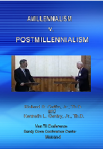
(DVD by Gentry and Gaffin)
Formal, public debate between Dr. Richard Gaffin (Westminster Theological Seminary)
and Kenneth Gentry at the Van Til Conference in Maryland.
See more study materials at: www.KennethGentry.com
Yet it would puzzle us to point out of what benefit it is to the world. The world, to all appearance, remains precisely as it was before. It is very clear that the world was not conceived by John as a redeemed world. We are not to love it, nor the things in it. We are rather to renounce it, as an inimical power. Nay, John declares roundly that the whole world—this whole world which we are invited to think of as having had all its sins expiated by the blood of Christ—“lieth in the evil one.” It is difficult to understand how a world all whose sins have been, and are continually as they emerge being—for that is the force of the representation—washed away in the blood of Christ, can still be lying in the evil one; that is to say, as A. Plummer expounds this declaration, still “remains in the power” of the evil one, “has not passed over, as Christians have done, out of death into life; but abides in the evil one, who is its ruler, as the Christian abides in Christ.” What we are asked to believe is nothing less than that the John who places the world and Christian in directly contrary relations to Christ, nevertheless in our present passage places them in precisely the same relation in Christ.
Nor is it easy to understand what can be meant by saying that men, all whose sins, as they occasionally emerge (“and he is,” not was, “a propitiation”) are covered from the sight of God by the death of Christ, nevertheless perish; and that because of rejection of the divinely appointed mediator of salvation. Is not the rejection of Jesus as our propitiation a sin? And if it is a sin, is it not like other sins, covered by the death of Christ? If this great sin is excepted from the expiatory efficacy of Christ’s blood, why did not John tell us so, instead of declaring without qualification that Jesus Christ is the propitiation for our sins, and not for ours only but for the whole world? And surely it would be very odd if the sin of rejection of the Redeemer were the only condemning sin, in a world the vast majority of the dwellers in which have never heard of this Redeemer, and nevertheless perish. On what ground do they perish, all their sins having been expiated?
(To be continued)






 [image error]
[image error]
November 27, 2015
WARFIELD ON 1 JOHN 2:2 (1)
 “Jesus Christ the Propitiation for the Whole World” (1)
“Jesus Christ the Propitiation for the Whole World” (1)
PMT 2015-0142 by Benjamin B. Warfield
[Gentry note: This is an excellent article by renowned postmillennial Princeton scholar, B. B. Warfield.]
“And he is the propitiation for our sins; and not for ours only, but also for the whole world.”
(1 John 2:2)
As a means of comforting Christians distressed by their continued lapses into sin, John, in the opening words of the second chapter of his first Epistle, is led to assure them that “we have an Advocate with the Father, Jesus Christ, a Righteous One”; and by way of showing how prevailing his advocacy is, to add, “And he is himself a propitiation for our sins.” There he might well have stopped. But, without obvious necessity for his immediate purpose, he adds this great declaration: “And not for ours only, but also for the whole world.” That by these words the propitiation wrought by Christ, of which we have continual need, and on which we continually draw in our need, is exalted by ascribing to it, in some sense, a universal efficacy, is clear enough. But the commentators, first and last, have not found it easy to make plain to themselves the precise nature of the universalism assigned therein to our Lord’s propitiatory sacrifice.
Difficulties for Commentators
Readers of old John Cotton’s practical notes on First John, for example, will not fail to observe that he moves with a certain embarrassment in his exposition of this universalism. He has a number of things, in themselves of value, to say about it; but he appears to find most satisfaction in the suggestion that although Christ by his expiatory death has bought for his people some things—and these the most important things—which he has not bought for all men, yet there are some most desirable things also which he has bought for all men. This, however, is certainly not what John says. It admits of no doubt that John means to say that the Christians whom he was addressing, and with whom he identifies himself—they and he alike—enjoy no privilege with reference to the propitiation of Christ, which is not enjoyed by them in common with “the whole world.” They—and he with them—are not to be disheartened by their sins, he says, because these sins have been expiated by the blood of Christ; by which have been expiated indeed, not their sins only but also those of “the whole world.” The “whole world” is not made in some general and subsidiary sense a beneficiary of Christ’s atoning death, but in this specific and highest sense — the expiation of its sins. Its sins have been as really and fully expiated as those of the Christians John was addressing, and as his own.
Thine Is the Kingdom
(ed. by Ken Gentry)
Contributors lay the scriptural foundation for a biblically-based, hope-filled postmillennial eschatology, while showing what it means to be postmillennial in the real world.
See more study materials at: www.KennethGentry.com
The most “modern” of modern expositors are as much at sea in the face of the universalism of this assertion as any of the older and presumably less instructed ones could be. Thus Otto Baumgarten simply declines to attempt its exposition. We do not know what John means, he says; we lack the necessary information to enable us to understand him. It may sound very fine to say that John teaches here that no shadow is cast on God’s holiness by the exhibition of partiality on his part for individuals; that he rebukes those who, in egotistic and sentimental religiosity, or in selfish anxiety for their own salvation, would draw apart from their fellows.
But difficulties remain. Experience scarcely encourages us to think that all without exception are sharers in Christ’s salvation; it rather bears out our Lord’s declaration that the gate is narrow and the way straitened that leads to life and few there be that find it. And John! Is not the whole world to him a massa corrupta—a “darkness” which does not “apprehend” “the light”? How we can harmonize the three passages— John 1:29, which speaks of taking away the sin of the world; John 3:16, “God so loved the world”; and this, declaring that Christ has made propitiation for the sins of the world—with John’s sharp dualism of Light and Darkness, does not appear.
Three Views on the Millennium and Beyond
(ed. by Darrell Bock)
Presents three views on the millennium: progressive dispensationalist, amillennialist, and reconstructionist postmillennialist viewpoints. Includes separate responses to each view.
See more study materials at: www.KennethGentry.com
Perhaps John is only repeating with thoughtless neglect of their inconsequence the elements of Paul’s doctrine of propitiation. Perhaps, mystical-speculative thinker that he is, he means to suggest that in Jesus’ purpose or general feeling his redemption was for the whole sinful world, but only those have found in him an actual Redeemer or Intercessor to whom he has given power to become Children of the Light. Perhaps it is, on the other hand, the missionary instinct of the Church, which declares here that no limits are to be set to the spread of salvation over the whole world—in contrast to the Gnostic confinement of it to certain gifted individuals. We can form many conjectures; we can reach no assurance.
(To be continued)








November 25, 2015
NT SUMMARY OF POSTMILLENNIALISM
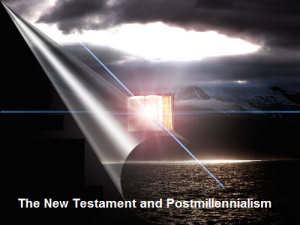 PMT 2015-141 by Kenneth L. Gentry, Jr.
PMT 2015-141 by Kenneth L. Gentry, Jr.
As we enter the New Testament record Christ’s birth immediately confronts us. The birth of “the Son of David, the Son of Abraham” (Mt 1:1) gloriously echoes the Old Testament victory theme, showing that his first coming begins the fruition of the promises (Lk 1:46–55, 68–79). The fullness of time comes in the first century through Christ’s incarnation (Gal 4:4; Eph 1:10; Tit 1:2–3).
Christ’s covenanted kingdom comes near in his early ministry because the “time was fulfilled” for it to come (Mk 1:14–15; Mt 3:2). Thus, John Baptist is something of a marker separating the fading Old Testament era from the dawning kingdom era (Mt 11:11–14; Mk 1:14–15; Jn 3:26–30).
During his earthly ministry we witness Christ’s power over demons as evidence that the kingdom has come (Mt 12:28). It does not await his second advent (Lk 17:20–21), for as he preaches the gospel, he claims to be king while on earth (Jn 12:12–15; 18:36–37). Following his resurrection and ascension, Pentecost becomes the celebration of his enthronement in heaven (Ac 2:30–36). From then on we hear of his being in a royal position at the right hand of Almighty God (Mk 16:19; Ro 8:34; Eph 1:20; 1Pe 3:22; Rev 3:21).
Because of this, first-century Christians proclaim him as a king (Ac 3:15; 17:7; Rev 1:5) possessing regal dignity, authority, and power (Eph 1:22; Php 2:9). Beginning in the first century people at conversion enter into the kingdom of Christ (Col 1:12, 13; 4:11; 1Th 2:12). Christ’s kingdom rule goes where his people go, for they are the subjects of his kingdom (Rev 1:6, 9) and are now mystically seated with him in a rulership position (Eph 1:3; 2:6; 1Co 3:21–22; Rev 3:21).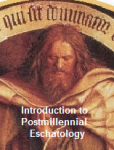
Introduction to Postmillennial Eschatology (10 mp3 lectures)
Southern California Center for Christian Studies seminar.
Lecture presentations and some classroom interaction.
Very helpful definition, presentation, and defense of postmillennialism.
See more study materials at: www.KennethGentry.com
The actual starting point of Christ’s kingly victory is at his resurrection from the dead (Mt 28:18–20; Ac 2:30–31; Ro 1:3–4) and his ascension to God’s right hand (Da 7:13–14, 27; Lk 22:69; 24:46–53). Celebrating his cosmic victory over sin, death, and Satan, he pours out his Spirit to empower his faithful subjects for kingdom service (Ac 2:32–33; Eph 4:8).
Christ’s kingdom is essentially spiritual in nature (Jn 18:36–37; Ro 14:17) and operates from within the heart (Lk 17:20–21). We enter his kingdom through salvation (Col 1:12, 13; Jn 3:3). He rules his kingdom by his mystical presence from heaven (Jn 18:36; Eph 4:8–14) and through the indwelling of the Holy Spirit (Jn 7:39; Ro 8:9; 1Co 3:16). The basic power of the kingdom is the “gospel of the kingdom” (Mt 4:23; 9:35; Mk 1:14–15), for it is the power of God unto salvation (Ro 1:16; 1Co 1:18; 2Co 6:7). The basic function of the kingdom is to promote God’s truth (Jn 18:37; 2Co 10:4–5).
The kingdom is not a future, Armageddon-introduced, earthly, political kingdom. By misreading Scripture, the first-century Jews seek a political kingdom to overthrow Rome, and when Christ does not offer them this they reject him (Jn 6:15). Even his disciples are confused and disappointed for a time (Lk 24:21–27). Israel as a geo-political entity is once for all set aside as the specially favored nation of God (Mt 8:11–12; 21:43), because of her prominent role in crucifying Christ (Ac 2:22–23,36; 3:13–15; 5:30; 7:52; 1Th 2:14–15). The Messianic kingdom includes people of all races on an equal basis (Isa 19:19–25; Zec 9:7; Ro 10:12; Gal 3:28; Eph 2:12–17; Col 3:11). Though God judges Israel in the first century and removes her “most favored nation” status, he does not irrevocably abandon the Jews, for eventually great numbers of them will enter his kingdom (Ro 11:11–25).
As God’s focus shifts from the single race of Israel, a confined land, and a single temple, the New Testament-phase church becomes “the Israel of God” (Gal 6:16), “the circumcision” (Php 3:3), “the seed of Abraham” (Gal 3:7, 29), the “Jerusalem above” (Gal 4:24–29), the “temple of God” (Eph 2:21), “a royal priesthood” and a “peculiar people” (1Pe 2:9–10). Consequently, we learn that promises to Israel apply to the church (Jer 31:31–34; Mt 26:28; Ac 15:12–17).
Evangelism is the essential pre-condition to postmillennial success. Apart from Christ we can do nothing (Jn 15:5; Mt 19:26); in him we can do all things (Php 4:13, 19; Mt 17:20). Because he possesses “all authority in heaven and on earth” (Mt 28:18; cp. Eph 1:19–22; Php 2:9–11), his Great Commission expects his people to win converts, baptize them into his body, and then instruct them in “all things” that he taught (Mt 28:19). Due to Christ’s glorious presence with us, the Great Commission expects all nations to convert to Christ (Mt 28:19; Jn 12:32), just as do the prophets (Ps 22:27–28; Isa 2:1–4; Mic 4:1–4). The kingdom comes gradually, growing and ebbing ever stronger as history unfolds over time (Da 2:35ff; Eze 17:22–24; 47:1–9; Mt 13:31–33; Mk 4:26–29).
The Lord’s Prayer
Eight mp3 sermons by Ken Gentry
Eight part expository sermon series covering each element in the Lord’s Prayer. Very practical; very theological. Shows the glory of God, in his sovereignty as prayer underscores the victory of his kingdom and the rule of his law in history. Excellent postmillennial resource from this beloved prayer.
See more study materials at: www.KennethGentry.com
The Christian witness involves exposing evil (Eph 5:11) and calling men to repentance from all unrighteousness in every realm (Lk 3:8; 24:47), so that Christ may take “every thought captive” (2Co 10:5). As citizens of Christ’s kingdom, Christians are to engage every area of life with body, soul, mind, and strength (Mk 12:37) to the glory of God (1Co 10:31; Col 3:17), for they will give an account of every word and deed (Mt 12:36; 2Co 10:5). God’s redemption in Christ will bring the world as a system to salvation (Jn 1:29; 3:17; 1Jn 2:2) as the vast majority of the world’s population converts to him (Jn 12:31; 1Ti 2:6). The stumbling of the Jews in rejecting Christ opens up the prospect of mass conversions from among the Gentiles (Ro 11:12). Eventually the vast majority of Jews and Gentiles alike will convert, leading to the “reconciliation of the world” (Ro 11:15, 25).
Christ is presently ruling and reigning from heaven (1Co 15:25a). He will not return in his second advent until “the end” of history (1Co 15:24), when he turns the kingdom over to the Father (1Co 15:28). His second advent will not occur until he conquers his earthly enemies (1Co 15:24). He will conquer his last enemy, death, at his return when we arise from the dead (1Co 15:26).
Christ’s gifts to his church well equip her for the task of winning the world to him. God the Father delights in the salvation of sinners (Eze 18:23; Lk 15:10). The gospel is nothing less than “the power of God unto salvation” (Ro 1:16; 1Co 1:18, 24). Therefore, the church has the certain hope of victory, not due to her own strength but God’s promise (Ac 13: 47–48; 15:14–19), Christ’s presence (Mt 28:20; Ac 18:10), and the Spirit’s power (Ro 8:9; 1Co 3:16).
Christ binds Satan in principle (i.e., definitively) during his ministry (Mt 12:28–29), thus casting him down from his dominance (Jn 12:31; Lk 17:10) on the basis of his redemptive labor (Col 3:15). Therefore, despite Satan’s great power, Christians may resist him, causing him to flee (Jas 4:7). They may even crush him beneath their feet (Ro 16:20) because “greater is he that is in you, than he that is in the world” (1Jo 4:4).









November 23, 2015
OT SUMMARY OF POSTMILLENNIALISM
 PMT 2015-140 by Kenneth L. Gentry, Jr.
PMT 2015-140 by Kenneth L. Gentry, Jr.
We can adequately understand God’s sovereign plan for the world only when we approach it in light of its historical inception. In the Bible’s account of universal origins we discover the very purpose of history. God creates man in his own image (Ge 1:26) as a materio-spiritual being (Ge 2:7). Man’s God-ordained purpose is to bring honor and glory to God by exercising godly dominion in the earth (Ge 1:26–30). Protology leads to eschatology for eschatology is rooted in creation.
Because God possesses almighty power (Job 40:1–42:6); Isa 40:12 –28), and governs by inscrutable wisdom (Isa 55:8–9; Ro 11:32–35), the Christian actually should be predisposed to the historical victory postmil-lennialism expects. The postmillennial system best balances the material and spiritual aspects of Scripture and gives full significance to both the temporal and eternal features of God’s plan and man’s obligation to him. The Lord creates man and history for his glory; therefore, man and history will bring glory to him. “You are worthy, O Lord, to receive glory and honor and power; for You created all things, and by Your will they exist and were created” (Rev 4:11). “For of Him and through Him and to Him are all things, to whom be glory forever. Amen” (Ro 11:36).
Great Commission and the Christian Worldview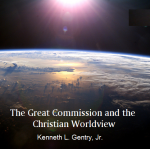
Nine mp3 lectures by Ken Gentry
In these nine lectures is demonstrated the world altering consequences of the Great Commission. An important and encouraging study on the biblical foundations of the Christian worldview.
See more study materials at: www.KennethGentry.com
Postmillennialism teaches that a time is coming in earth history, continuous with the present and resulting from currently operating, God-ordained spiritual forces, in which the overwhelming majority of men and nations will voluntarily bow in salvation to the lordship of Jesus Christ. This humble submission to his gracious scepter will issue forth in widespread righteousness, peace, and prosperity. Scripture’s eschatology is victory-oriented. This victory-orientation begins with the protoevangelium in Genesis and weaves its golden cord throughout Scripture all the way through Revelation 22. Certainly the biblical record expects struggle in history due to man’s fall. But it is a struggle that will triumphantly issue forth in victory rather than deadlock, defeat, or despair. The Seed of the Woman (Christ) will conquer the Seed of the Serpent (Satan) — in time and on earth. This is a fundamental truth of biblical eschatology.
We may trace the victory theme through the outworking of the Lord God’s sovereign covenant. His administration of universal affairs is covenantal, unfolding in Scripture through a series of unified, successive, and judicially related covenants. Hence, Paul speaks of “the covenants of the promise” (Eph 2:12). The Adamic (Ge 1:26–30) and Noahaic (Ge 9:1–17) covenants set the stage for the dominion of godly man and the victory of God’s saving grace in history. The Abrahamic Covenant promises the spread of salvation to “all the families of the earth” (Ge 12:1–3). The gospel is the tool for the spread of the Abrahamic blessings through both family generation and evangelistic outreach (see Gal 3:8, 29). The Davidic Covenant identifies the regal nature of the pre-eminent covenant seed, Jesus Christ, and secures his throne and gracious rule in the plan of God (2Sa 7:8–16). The new covenant insures the victory of God’s grace by working in the hearts of men (Jer 31:31–34; Lk 22:20; 1Co 11:25; 2Co 3:6; Heb 8:8–13).
Homosexual Question
(5 mp3s sermons by Ken Gentry)
The homosexual movement is one of the leading challenges to the moral stability of
American culture and to our Christian influence in culture.
In this sermon series Dr. Gentry tackles the homosexual question head on
See more study materials at: www.KennethGentry.com
Maintaining covenantal harmony, the patriarchal and Mosaic era prophecies foresee a time in earth history, issuing forth from Christ’s first advent, in which God’s glory and righteousness will cover the earth (Ge 22:17; 49:10; Nu 24:17–19). The Old Testament prophets, as prosecutors exercising God’s covenant lawsuits, continue the hope of victory — despite opposition from without and defection from within Israel. They command kings and judges of all the earth to bow to Christ, and promise that the ends of the earth will turn to God in salvation (Ps 2; 22; 72; Isa2:1–4; 9:6–7; Mic 4:1–4; Zec 14).
Although, early on, God’s gracious saving work largely confines itself to Abraham’s family, it is not always to be thus. God will gain the victory apart from Jewish exclusiveness and Old Testament ceremonial distinctives. All people who receive God’s grace will be on an equal footing before him (Isa 19:21–24; Jer 3:16–17; 31:31–34; 48:47; 49:6, 39).









Kenneth L. Gentry Jr.'s Blog
- Kenneth L. Gentry Jr.'s profile
- 85 followers











